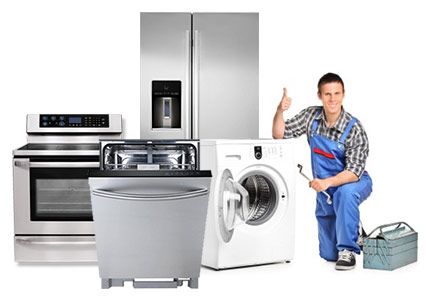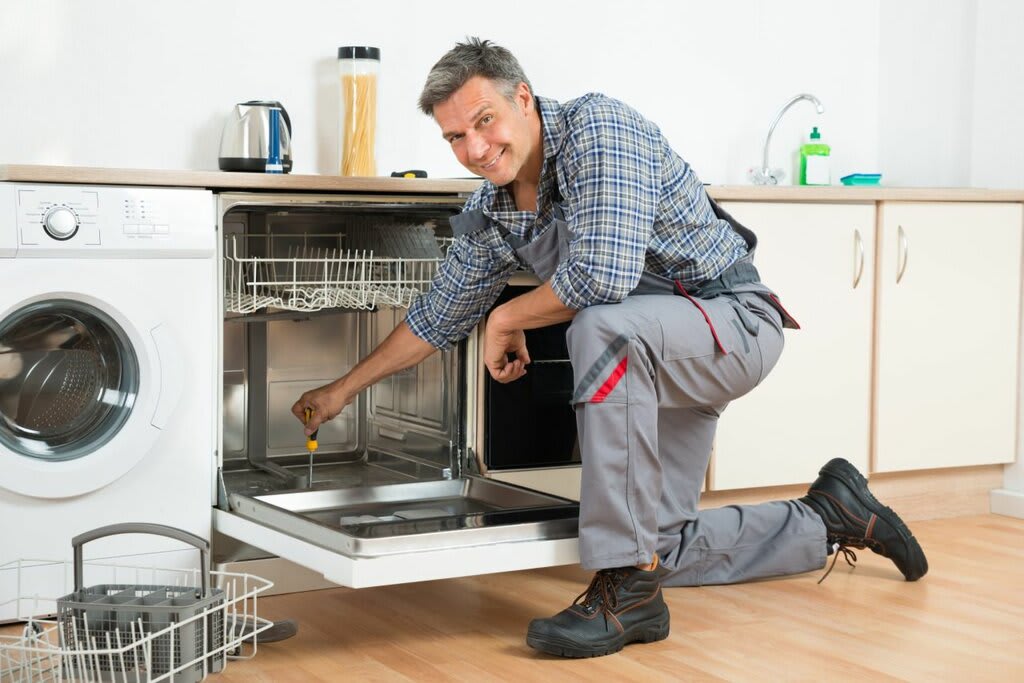The Ultimate Guide to Understanding Appliance Repair Work in your home
When your fridge quits cooling down or your stove refuses to heat, it can feel overwhelming. Comprehending device repair work in your home can conserve you money and time. You'll discover to identify signs, use important devices, and adhere to a methodical troubleshooting process. However before you start, there are important safety preventative measures you require to think about. What are one of the most usual problems, and how can you fix them? Let's explore the essentials.
Typical Appliance Issues and Their Signs
When your home appliances start breaking down, it's necessary to acknowledge the indications at an early stage. Ignoring them can result in larger concerns and expensive fixings. For example, if your fridge isn't cooling correctly, you might discover warm places or condensation creating. This might suggest a failing compressor or a blocked vent.Your dishwashing machine may reveal issues via dirty recipes or uncommon noises throughout cycles. If you hear grinding or clanking, it's time to investigate.A cleaning machine that won't spin or drain pipes can leave you with soggy washing, suggesting a clogged up drainpipe or a malfunctioning pump.Lastly, if your oven's temperature level seems off or it takes permanently to preheat, you could be dealing with a defective thermostat. By remaining alert to these symptoms, you can resolve concerns prior to they escalate into significant repair work.
Vital Tools for Home Appliance Repair
When you're tackling appliance repair services at home, having the right devices is important. Fundamental hand tools like screwdrivers and pliers will certainly assist you take apart and deal with various home appliances, while electrical testing devices guarantee you're working safely with electrical wiring. Let's review what you need to get going on your repair work journey.
Basic Hand Tools
Having the right tools is necessary for reliable appliance fixing at home. Start with a dependable screwdriver collection, consisting of both flathead and Phillips kinds, as screws are typical in device assembly. Pliers are likewise essential; they aid with gripping, twisting, and cutting cables or tiny elements. A set of needle-nose pliers can get to difficult situations conveniently. You'll need a good flexible wrench for tightening up or loosening nuts and screws. An utility blade is useful for cutting with packaging or insulation. Don't fail to remember a sturdy workbench or surface to securely organize your devices and parts. With these basic hand tools, you'll be well-prepared to tackle most device repairs that come your means.
Electrical Testing Instruments
Alongside fundamental hand devices, electric testing gadgets play an important function in appliance repair service. These tools help you detect electric issues and warranty devices operate safely. A multimeter is important; it measures voltage, existing, and resistance, enabling you to determine issues quickly. A non-contact voltage tester is an additional essential, allowing you identify online cords without making direct contact, boosting your safety and security. Clamp meters are wonderful for determining existing circulation in cords without detaching them, conserving you effort and time. Furthermore, circuit testers can swiftly examine if outlets are functioning correctly. By making use of these gadgets, you'll streamline your troubleshooting procedure and enhance your repair work skills, making appliance maintenance a lot simpler.
Step-by-Step Overview to Diagnosing Device Issues
When your appliance breaks down, it can be frustrating, yet diagnosing the problem doesn't have to be frustrating. You'll discover to determine typical problems and apply reliable troubleshooting strategies. Allow's go through the actions to get your home appliance back in functioning order.
Typical Appliance Problems

Repairing Techniques Discussed

Repairing Major Kitchen Area Appliances: A Closer Look
Have you ever before questioned exactly how to deal with common issues with your kitchen area appliances? Repairing significant cooking area appliances like fridges, ovens, and dishwashing machines can be easier than you think. Begin by identifying the trouble-- whether it's a refrigerator not cooling or a stove that will not heat up. Frequently, a basic reset or examining the power resource can address the issue.For fridges, tidy the condenser coils and inspect the door seals. If your stove's not home heating, evaluate the burner and thermostat. Dish washers might just need a tidy filter or a reset to obtain them back in action. Constantly disconnect the device prior to diving right into repair work to ensure your safety.Don' t neglect to speak with the user manual for details fixing ideas related to your version. With a little persistence and the right tools, you can with confidence take on home appliance repair work and conserve money in the procedure!

Repairing Washing Equipments: Tips and Techniques
When your washing appliances begin breaking down, it can really feel frustrating, yet fixing them does not have to be an inconvenience. Start by checking the power supply. Validate the device is connected in and the electrical outlet is working. Next, evaluate the door or lid button; a malfunctioning switch can avoid the equipment from operating.For washers, if it's not spinning, look for out of balance loads. Redistributing the clothes may resolve the issue. If your clothes dryer isn't home heating, tidy the lint filter and check the vent for blockages.Listen for unusual noises; they can indicate a problem. If your appliance is dripping, inspect the hoses for splits or loosened links. File any error codes shown on electronic displays, as they can lead you in recognizing the concern. Seek advice from the user handbook for particular fixing tips related to your model.
Safety Precautions to Take During Fixes
Before you start any kind of home appliance fixings, it's necessary to prioritize safety to protect against mishaps or injuries. Disconnect the home appliance or transform off the circuit breaker to ensure no power reaches it while you function. Use protected tools to reduce the risk of electrical shock. Put on safety and security goggles and handwear covers to safeguard on your own from sharp sides or debris (Fixes washers and dryers Oro valley Dependable Appliance Repair).Make specific your workspace is clean and well-lit, so you can see what you're doing. Maintain youngsters and family pets away from the area to avoid distractions and prospective dangers. If you're managing gas devices, be additional mindful; look for leaks prior to proceeding.Take your time, and do not rush with fixings. If you feel unsure about any type of action, it's far better to pause and research than to presume. Complying with these safety measures will help develop a much safer environment for your DIY appliance repair job
When to Call a Professional for Help
How do you understand if it's time to hire an expert for home appliance repair work? If you've tried fundamental troubleshooting without success, it's a clear indicator. As an example, if your home appliance still won't begin or reveals uncommon noises after resetting it, don't think twice to seek expert help.When you discover leaks, smoke, or shedding scents, focus on safety and call a pro quickly. These issues can lead to more significant damage or posture threats to your home.Also, if your device is under warranty, speaking to an expert is frequently the most effective path. They can assure that repairs will not void your warranty, saving you cash in the long run.Finally, if you're uncertain or uncomfortable with complex repair work, it's important to leave it to the experts. Remember, tackling challenging concerns without the right know-how can lead to expensive errors. Count on a professional when unsure!
Frequently Asked Concerns
How Can I Prevent Device Troubles in the Future?
To stop device problems in the future, you should do routine upkeep, look for damage, tidy filters, and stay clear of overloading. Remaining proactive will assist extend their lifespan and keep them running smoothly.
What Are the Many Common DIY Appliance Repair Work Mistakes?
You might neglect safety and security preventative measures, skip troubleshooting steps, or use wrong tools when trying DIY appliance repair work. Hurrying the process or overlooking manufacturer standards can result in even more considerable concerns and pricey errors. Keep individual and notified!
How Do I Know if a Component Needs Replacement?
You can inform if a component needs substitute by looking for unusual noises, leaks, or inconsistent performance. If the appliance has a hard time to run correctly or reveals noticeable damages, it's most likely time for a substitute.
Can I Use Generic Components for Device Services?
Yes, you can use common components for device repair work, however ascertain they're suitable - Dryer repair Oro Valley Dependable Refrigeration & Appliance Repair Service. Generic parts could conserve you money, however they might affect efficiency or durability, so evaluate your options thoroughly prior to making a choice
What Service Warranties Cover Device Repair Works?
Most appliance service warranties cover repair services for producing problems, yet they commonly omit damage from misuse. Examine your service warranty terms meticulously, as some could require using certified specialists and original components for insurance coverage to remain legitimate.